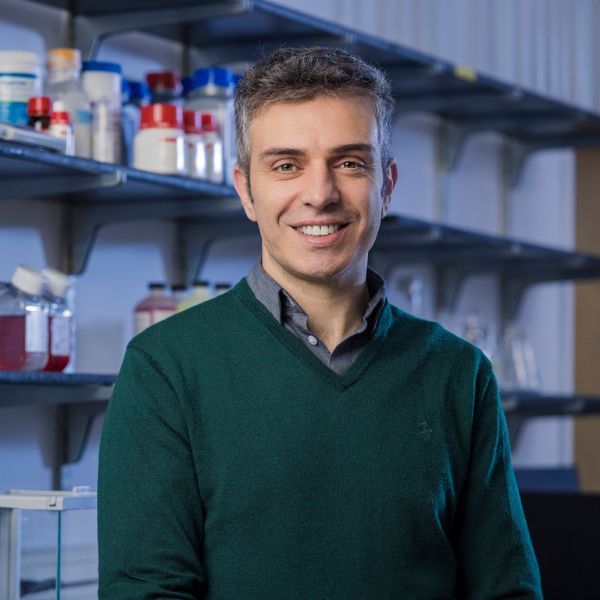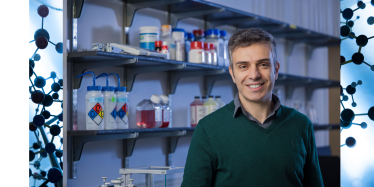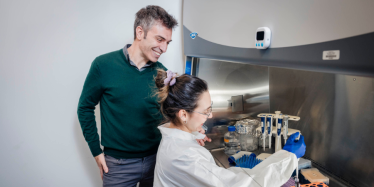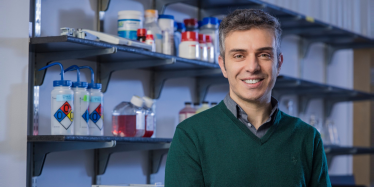Filippo Veglia, Ph.D.
-
Assistant Professor, Genome Regulation and Cell Signaling Program, Ellen and Ronald Caplan Cancer Center
Dr. Filippo Veglia is an expert in myeloid cell biology, cancer immunology, and tumor metabolism. He is dedicated to advancing cancer research by developing innovative, immune-based approaches to improve treatment and patient outcomes.
Dr. Veglia earned his Ph.D. in Immunology and Applied Biotechnology from Tor Vergata University in Rome, Italy. He completed his postdoctoral training in the lab of Dr. Dmitry Gabrilovich at The Wistar Institute. In 2020, he was appointed Assistant Member at Moffitt Cancer Center in the Department of Immuno-Oncology and joined the Neuro-Oncology Program. He returned to Wistar in December 2023 as an Assistant Professor in the Immunology, Microenvironment and Metastasis Program and, in 2024, also became part of the Genome Regulation and Cell Signaling Program.
The Veglia Laboratory

The Veglia Laboratory
Glioblastoma (GBM) is the deadliest form of brain cancer, known for its ability to shut down the immune system and resist treatment. A major reason for this is the presence of myeloid cells—immune cells that, under the influence of the tumor environment, are reprogrammed to support the cancer instead of fighting it.
Our lab studies how the tumor microenvironment reprograms the metabolism and function of these myeloid cells. By uncovering the shared pathways that drive their immunosuppressive behavior, we aim to find new ways to target them, restore the body’s natural immune defenses, and make immunotherapy more effective against brain cancer.
-
Staff Scientist
Alessandra De Leo, Ph.D.
-
Postdoctoral Fellows
Barbara Peixoto, Ph.D.
Alessio Ugolini, Ph.D.
-
Postdoctoral fellow and research assistant positions are available in the Veglia Laboratory. Candidates should have recently received or be close to obtaining their Ph.D. degree or equivalent (for postdoc) or B.S. degree or equivalent (for RA) and have a strong background in in immunology, tumor microenvironment, and molecular biology. Interested applicants are invited to email: fveglia@wistar.org
-
Staff Scientist
Alessandra De Leo, Ph.D.
-
Postdoctoral Fellows
Alessio Ugolini, Ph.D.
-
Predoctoral Trainees
Filippo Badii
-
Learn about job opportunities at The Wistar Institute here.
Lab in the News
Selected Publications
Protocol to study the genomic profile of histone lactylation with CUT&RUN assay in tumor-associated macrophages
Alessandra De Leo, Alessio Ugolini, Filippo Veglia. Protocol to study the genomic profile of histone lactylation with CUT&RUN assay in tumor-associated macrophages. STAR Protocols. doi: 10.1016/j.xpro.2025.103766. PMID: 40220301 PMCID: PMC12018546
Functional Reprogramming of Neutrophils within the Brain Tumor Microenvironment by Hypoxia-Driven Histone Lactylation
Alessio Ugolini, Alessandra De Leo, Xiaoqing Yu, Fabio Scirocchi, Xiaoxian Liu; Barbara Peixoto, Delia Scocozza, Angelica Pace, Michela Perego, Alessandro Gardini, Luca D’Angelo, James K.C. Liu, Arnold B. Etame, Aurelia Rughetti, Marianna Nuti, Antonio Santoro, Michael A. Vogelbaum, Jose R. Conejo-Garcia, Paulo C. Rodriguez, Filippo Veglia. Functional Reprogramming of Neutrophils within the Brain Tumor Microenvironment by Hypoxia-Driven Histone Lactylation. Cancer Discov (2025) 15 (6): 1270–1296. doi: 10.1158/2159-8290.CD-24-1056. PMID: 40014923
Glucose-driven histone lactylation promotes the immunosuppressive activity of monocyte-derived macrophages in glioblastoma
De Leo A, Ugolini A, Yu X, Scirocchi F, Scocozza D, Peixoto B, Pace A, D’Angelo L, Liu JKC, Etame AB, Rughetti A, Nuti M, Santoro A, Vogelbaum MA, Conejo-Garcia JR, Rodriguez PC, Veglia F. Glucose-driven histone lactylation promotes the immunosuppressive activity of monocyte-derived macrophages in glioblastoma. Immunity. 2024 Apr 30:S1074-7613(24)00211-5. doi: 10.1016/j.immuni.2024.04.006. Epub ahead of print. PMID: 38703775.
Analysis of classical neutrophils and polymorphonuclear myeloid-derived suppressor cells in cancer patients and tumor-bearing mice
Veglia F, Hashimoto A, Dweep H, Sanseviero E, De Leo A, Tcyganov E, Kossenkov A, Mulligan C, Nam B, Masters G, Patel J, Bhargava V, Wilkinson P, Smirnov D, Sepulveda MA, Singhal S, Eruslanov EB, Cristescu R, Loboda A, Nefedova Y, Gabrilovich DI. Analysis of classical neutrophils and polymorphonuclear myeloid-derived suppressor cells in cancer patients and tumor-bearing mice. J Exp Med. 2021 Apr 5;218(4):e20201803. doi: 10.1084/jem.20201803. PMID: 33566112; PMCID: PMC7879582.
Polymorphonuclear myeloid-derived suppressor cells limit antigen cross-presentation by dendritic cells in cancer
Ugolini A, Tyurin VA, Tyurina YY, Tcyganov EN, Donthireddy L, Kagan VE, Gabrilovich DI, Veglia F. Polymorphonuclear myeloid-derived suppressor cells limit antigen cross-presentation by dendritic cells in cancer. JCI Insight. 2020 Aug 6;5(15):e138581. doi: 10.1172/jci.insight.138581. PMID: 32584791; PMCID: PMC7455061.
Fatty acid transport protein 2 reprograms neutrophils in cancer
Veglia F, Tyurin VA, Blasi M, De Leo A, Kossenkov AV, Donthireddy L, To TKJ, Schug Z, Basu S, Wang F, Ricciotti E, DiRusso C, Murphy ME, Vonderheide RH, Lieberman PM, Mulligan C, Nam B, Hockstein N, Masters G, Guarino M, Lin C, Nefedova Y, Black P, Kagan VE, Gabrilovich DI. Fatty acid transport protein 2 reprograms neutrophils in cancer. Nature. 2019 May;569(7754):73-78. doi: 10.1038/s41586-019-1118-2. Epub 2019 Apr 17. PMID: 30996346; PMCID: PMC6557120.


